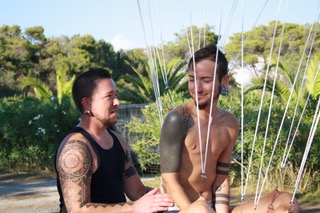
Source: FManfredi
Seminar on the 1st February 2023
Hooks and pain: Ethical concerns in practice-based research on body suspensions.
In this online seminar Federica Manfredi reflects on various ethical dilemmas relating to practice-based research on body suspensions.
Body suspensions are a challenging fieldwork of investigation because, according to research partners, “words are not enough” to express such intense experiences.
A body suspension consists in the elevation of a protagonists inserting hooks in the skin as temporary piercings; hooks are connected to an above scaffolding with ropes and pulling the main one, the suspendee leaves the floor for a variable amount of time. Body suspensions are realized in contemporary Europe during festivals and private events by a trans-spatial community of practitioners, that often privilege privacy and online invisibility to prevent stigmatization. Suspension experiences are delegitimized by non-suspendees because of the voluntary pain: it is elected as evidence of mental deviancy, even by a pathologizing bibliography, delegitimating the voices of practitioners.
The anthropological research “Learning to Fly” investigated meanings associated to suspensions by regular practitioners through a tailor-designed experimental methodology to overpass logo-centric logics. In a creative laboratory, participants co-created symbolic objects with metaphorical meanings to express one or more aspects of their hook-experiences. Handcrafts became referents of oral narrative during interviews, being able to express more than what the suspendee (or the ethnographer) pre-established to investigate, and exploring more than what words were allowed to share before. Ethical concerns emerged in several moments of the ethnography, especially concerning the desire to circulate the handcrafts to support the spread of a restored image of body suspension. Illustrating exhibition contexts and the consequences of the handcraft circulation, this presentation aims to discuss the militant use of the ethnography, the limits of the outsider positioning of the ethnographer, and the use of research’s results by epistemic partners.
After a Master Degree in Cultural Anthropology at the University of Turin (2009), Federica Manfredi started her militant approach to anthropology in Switzerland working for the visibility of local farmers, the defense of women and children rights, and the prevention of suicides. Upon return to Italy she received a post-master degree in Migration and Psychopathology developing a research on meanings associated to the “good death” among migrants. In 2014 she published her first monograph “I volti celati di Civitavecchia” about the trance experienced by penitents during Holy Friday and, between two kids, she was awarded a grant for her doctoral project on body suspensions in contemporary Europe. During the PhD in Medical Anthropology at the University of Lisbon (2022), she explored experimental methodologies of qualitative investigation, in balance between online and offline interactions, developing the theoretical proposal of the trans-spatiality. As member of the scientific project Excel – The Pursuit of Excellence, Federica investigated body modifications and body hacking, and she worked on the dissemination activities of the project with the workshop series The Hacked Barbie. Part of the organizing committee of the art exposition “Being F**king Perfect – The Pursuit of Excellence” (Lisbon 2022), she engaged for the promotion of the scientific labour in an accessible format for the non-academic public, cooperating with visual facilitators and artists. Federica is currently scientific consultant for private medical companies in Italy and Denmark as behavioral specialist, and she is working on new projects about the anthropology of pain.
Subscribe to the recordings:
Video hosted on the PAR YouTube channel.
Audio hosted on the PAR Buzzsprout channel and can be listened to on Spotify, Apple podcasts or on other RSS podcast apps.
The Practice As Research network with its resources is free and always will be, but it does of course incur costs to run and to keep it running. If you use it and benefit, enjoy it and would like to keep it going, please, consider leaving something in the tip jar. Thank you!